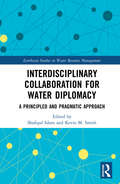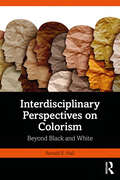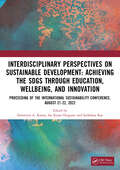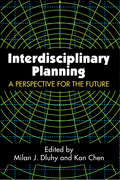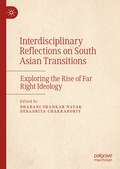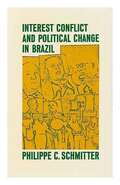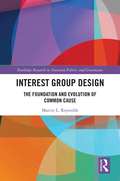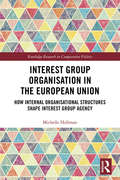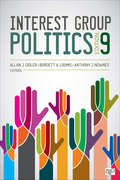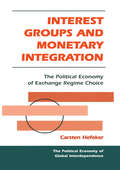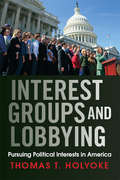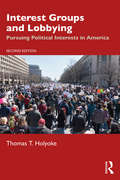- Table View
- List View
Interdisciplinary Collaboration for Water Diplomacy: A Principled and Pragmatic Approach (Earthscan Studies in Water Resource Management)
by Shafiqul Islam Kevin M. SmithThis book introduces the concept of Water Diplomacy as a principled and pragmatic approach to problem-driven interdisciplinary collaboration, which has been developed as a response to pressing contemporary water challenges arising from the coupling of natural and human systems. The findings of the book are the result of a decade-long interdisciplinary experiment in conceiving, developing, and implementing an interdisciplinary graduate program on Water Diplomacy at Tufts University, USA. This has led to the development of the Water Diplomacy Framework, a shared framework for understanding, diagnosing, and communicating about complex water issues across disciplinary boundaries. This framework clarifies important distinctions between water systems - simple, complicated, or complex - and the attributes that these distinctions imply for how these problems can be addressed. In this book, the focus is on complex water issues and how they require a problem-driven rather than a theory-driven approach to interdisciplinary collaboration. Moreover, it is argued that conception of interdisciplinarity needs to go beyond collaboration among experts, because complex water problems demand inclusive stakeholder engagement, such as in fact-value deliberation, joint fact finding, collective decision making, and adaptive management. Water professionals working in such environments need to operate with both principles and pragmatism in order to achieve actionable, sustainable, and equitable outcomes. This book explores these ideas in more detail and demonstrates their efficacy through a diverse range of case studies. Reflections on the program are also included, from conceptualization through implementation and evaluation. This book offers critical lessons and case studies for researchers and practitioners working on complex water issues as well as important lessons for those looking to initiate, implement, or evaluate interdisciplinary programs to address other complex problems in any setting.
Interdisciplinary Essays on Cannibalism: Bites Here and There (Warwick Series in the Humanities)
by Giulia ChampionInterdisciplinary Essays on Cannibalism: Bites Here and There brings together a range of works exploring the evolution of cannibalism, literally and metaphorically, diachronically and across disciplines. This edited collection aims to promote a conversation on the evolution and the different uses of the tropes and figures of cannibalism, in order to understand and deconstruct the fascination with anthropophagy, its continued afterlife and its relation to different disciplines and spaces of discourse. In order to do so, the contributing authors shed a new light not only on the concept, but also propose to explore cannibalism through new optics and theories. Spanning 15 chapters, the collection explores cannibalism across disciplines and fields from Antiquity to contemporary speculative fiction, considering history, anthropology, visual and film studies, philosophy, feminist theories, psychoanalysis and museum practices. This collection of thoughtful and thought-provoking scholarly contributions suggests the importance of cannibalism in understanding human history and social relations.
Interdisciplinary Perspectives on Colorism: Beyond Black and White
by Ronald E. HallThis timely and unique book explores the concept of colorism, which is discrimination based on the color of a person’s skin, in a world where arguably light skin is privileged over dark, and one’s wealth, health, and opportunities are impacted by skin color, sometimes irrespective of one’s racial background. In the context of our multi-cultural and increasingly global society, and the historical backdrop of slavery, the text takes a unique approach by moving from personal anecdotes to adopting a scientific perspective grounded in empirical evidence. Hall explores how skin color is a more effective framework for examining prejudice and discrimination, as racial identities become increasingly mixed due to inter-racial unions and immigration. He argues that racism as discrimination by race is contrived, polarizing, and non-quantifiable, and that it is often skin color that is used to "identify" race, often inaccurately. With skin color being a visual and physical characteristic, with race-based prejudices attached to it, the author shows how skin color can be a loaded identifier of value and identity. In a world where the objective measure of skin color crosses racial boundaries and where race will become increasingly indiscernible over time, the ultimate aim of this book is to prepare for the social future of mankind that has already begun to take shape. Split into three parts, examining historical, contemporary, and potential future perspectives on colorism, this is fascinating reading for students and academics in psychology, social work, education, criminal justice, and other social sciences. The text will also be useful for providing validation for including colorism into the public domain.
Interdisciplinary Perspectives on Colorism: Beyond Black and White
by Ronald E. HallThis timely and unique book explores the concept of colorism, which is discrimination based on the color of a person’s skin, in a world where arguably light skin is privileged over dark, and one’s wealth, health, and opportunities are impacted by skin color, sometimes irrespective of one’s racial background.In the context of our multi-cultural and increasingly global society, and the historical backdrop of slavery, the text takes a unique approach by moving from personal anecdotes to adopting a scientific perspective grounded in empirical evidence. Hall explores how skin color is a more effective framework for examining prejudice and discrimination, as racial identities become increasingly mixed due to inter-racial unions and immigration. He argues that racism as discrimination by race is contrived, polarizing, and non-quantifiable, and that it is often skin color that is used to "identify" race, often inaccurately. With skin color being a visual and physical characteristic, with race-based prejudices attached to it, the author shows how skin color can be a loaded identifier of value and identity. In a world where the objective measure of skin color crosses racial boundaries and where race will become increasingly indiscernible over time, the ultimate aim of this book is to prepare for the social future of mankind that has already begun to take shape. Split into three parts, examining historical, contemporary, and potential future perspectives on colorism, this is fascinating reading for students and academics in psychology, social work, education, criminal justice, and other social sciences. The text will also be useful for providing validation for including colorism into the public domain.
Interdisciplinary Perspectives on Covid-19 and the Caribbean, Volume 1: The State, Economy and Health
by Sherma Roberts Halimah A. F. DeShong Wendy C. Grenade Dwayne DevonishCaribbean countries have had to navigate multiple crises, which have tested their collective resolve through time. In this regard, the region’s landscape has been shaped by an interplay of vulnerability and resilience which has brought to the fore possibilities and contradictions. It is within this context that the effects of the COVID-19 pandemic must be considered. Interdisciplinary Perspectives on Covid-19 and the Caribbean, Volume 1: The State, Economy and Health provides a comprehensive, multi- and interdisciplinary assessment of the impact of the COVID-19 pandemic, using the Caribbean as the site of enquiry. The edited collection mobilises critical perspectives brought to bear on research produced within and beyond the boundaries and boundedness of conventional academic disciplinary divides, in response to the multi-dimensional crises of our time. The culmination of this collection offers a reimagining of our Caribbean contemporary futures in the hope of finding home-grown solutions, avenues and possibilities. This volume is divided into five (5) parts consisting of twenty-four (24) chapters and weaves together thematic strands that focus on governance, the macro and micro aspects of the economy, tourism and hospitality, business management and public health policy. Together, the chapters in this volume tell the story of the extent and effects of Caribbean governments’ response to the pandemic and the ways in which industries and organisations have had to pivot to survive and transform their management and operational practices.
Interdisciplinary Perspectives on International Law and International Relations
by Jeffrey L. Dunoff Mark A. PollackInterdisciplinary Perspectives on International Law and International Relations: The State of the Art brings together the most influential contemporary writers in the fields of international law and international relations to take stock of what we know about the making, interpretation and enforcement of international law. The contributions to this volume critically explore what recent interdisciplinary work reveals about the design and workings of international institutions, the various roles played by international and domestic courts, and the factors that enhance compliance with international law. The volume also explores how interdisciplinary work has advanced theoretical understandings of the causes and consequences of the increased legalization of international affairs.
Interdisciplinary Perspectives on Socioecological Challenges: Sustainable Transformations Globally and in the EU (Routledge Studies in Sustainable Development)
by Anders Siig Andersen Henrik Hauggaard-Nielsen Thomas Budde Christensen Lars HulgaardThis book explores interdisciplinary perspectives on socioecological challenges and offers innovative solutions at both a European and global level. This book critically reflects on the latest scientific knowledge regarding the increasing instability of the Earth System caused by human activities during the Anthropocene and the Great Acceleration. It focuses on the global and European challenges regarding climate, resources, bio-integrity, and environment. The authors assess the obstacles to overcoming these challenges and examine the risks posed by path dependencies, lock-ins, and trade-offs between global and regional goals. They also drill down into the complexities of the European Green Deal, specifically the similarities and differences between the scientific analyses and recommendations from the European Environment Agency and the content of the Deal. Finally, the book looks at the Just Transition put forward by the European Green Deal. The authors discuss this in a context of global and European ecological and socioecological challenges and put the question of equality, recognition, and democratization at the center. Outlining new pathways to broaden the scope of scientific collaboration between the natural and technical sciences and the social sciences and the humanities, this volume will be of great interest to students and scholars of sustainable development, environmental policy and governance, and environmental justice.
Interdisciplinary Perspectives on Sustainable Development: Achieving the SDGs through Education, Wellbeing, and Innovation
by Sai Kiran Oruganti Sudeshna Ray Dimitrios A. KarrasISC 2022 is dedicated to the Niti Aayog policies to promote sustainability through exchange of ideas emerging out of the academia. The ISC is an annual conference that is held in virtual mode until COVID restrictions on travel exist. The vision of the conference is to capacitate Academia with the necessary ideas that provide insights of the grassroot level development to various stakeholders of the Niti-Aayog policies. Towards this goal, the conference creates a conjunction of various stakeholders of Niti-Aayog policies that include- academic institutions, government bodies, policy makers and industry. The ISC organizers make concerted efforts to promote academic research that would technological, scientific, management & business practices, and insights into policy merits & disruptions. The framework of exchange of ideas is geared towards adoption of deep technologies, fundamental sciences & engineering, energy research, energy policies, advances in medicine & related case studies. This framework enables the round table discussions between the academia, industry and policy makers through its range of plenary and keynote speakers.
Interdisciplinary Planning
by Milan J. Dluhy, Kan ChenCritiques of traditional urban planning are numerous. The debate about direction within the profession and why urban planning seems to be in a state of despair continues. However, and as Milan J. Dluhy and Kan Chen note, the more critical issue is the future direction of planning, particularly interdisciplinary planning. In this regard, they note five principal areas of concern: planning is action research, planning is knowledge driven, planning is both process and technologically oriented, planning is interdisciplinary, and planning is adaptive to emerging concerns.Reviewing the literature and empirical studies on roles and attitudes, the editors note that planners seem committed to symbols and expressions of advocacy as well as traditional planning doctrine. This emphasizes rational planning and neutral policy roles for practitioners. Without a guiding theory to give a unified approach to practice, planners remain free to select the role most compatible with their personal background and training. This volume asserts that diversity need not be a drawback as long as careful analysis and open planning processes are used.This title will be an invaluable resource. Part I illustrates the critical dilemmas in planning, Part II focuses on planning skills and orientations, the third part focuses sharply on planning roles, while the final section answers a fundamental question: can interdisciplinary planning offer a more useful perspective than others on how to achieve more successful planning outcomes?
Interdisciplinary Reflections on South Asian Transitions: Exploring the Rise of Far Right Ideology
by Bhabani Shankar Nayak Debadrita ChakrabortyThis book presents an interdisciplinary understanding of the social, and economic drivers of far-right politics in South Asia. In response to the growth of xenophobia, reactionary nationalism, authoritarianism, and aggressive leadership in the region, it examines both the religious and economic conditions that have encouraged far-right populism and the profit-driven capitalist systems it produces. The book also delves into the unique histories of South Asia, along with the region's religious and cultural traditions, to provide context for broader economic and political trends and shed light on the consolidation of wealth and growing inequality.The book thoroughly explores the economic and political transformation of South Asia resulting from far-right populism, making it a valuable resource for students and researchers in the fields of political economy and South Asian studies.
Interessenorganisation: Begriffsbestimmung, Definition und Typologie (essentials)
by Deniz Z. ErtinDas vorliegende Buch beschäftigt sich mit der Begriffsbestimmung und Definition von Interessenorganisationen. Dabei wird die Nutzung unterschiedlicher Begriffe in der deutschen und englischen politikwissenschaftlichen Literatur diskutiert. Des Weiteren werden auch die begriffsgeschichtlichen und theoretischen Aspekte dieser Begriffe erläutert und ausgeführt. Neben der Definition des Begriffs werden auch die verschiedenen Typologien von Interessenorganisation untersucht und differenziert. Anhand von praktischen Beispielen werden diese Typologien diskutiert und angewendet.
Interest Conflict And Political Change In Brazil
by Philippe C. SchmitterInterest Conflict And Political Change In Brazil
Interest Group Design: The Foundation and Evolution of Common Cause (Routledge Research in American Politics and Governance)
by Marcie L. ReynoldsIn Interest Group Design, Marcie L. Reynolds examines the evolution of Common Cause, the first national government reform lobby. Founded in 1970 by John W. Gardner, the organization gained influence with Congress and established an organizational culture that lasted several decades. External and internal environmental changes led to mounting crises, and by 2000, Common Cause’s survival was in question. Yet fifteen years later, Common Cause is a renewed organization, with evidence of revival across the U.S. Empirical evidence suggests how Common Cause changed its interest group design but kept its identity in order to survive. Utilizing a mixed-methods approach to frame and analyze the history of Common Cause, Reynolds provides a lens for studying how key aspects of the U.S. political system—interest groups, collective action, lobbying, and representation—work as environments change. She extends work by previous scholars Andrew S. McFarland (1984) and Lawrence Rothenberg (1992), creating a sequence of analytical research about one interest group spanning almost fifty years, a unique contribution to political science. This thoroughly researched and comprehensive book will be of great interest to those who study political participation and organizational change.
Interest Group Organisation in the European Union: How Internal Organisational Structures Shape Interest Group Agency (Routledge Research in Comparative Politics)
by Michelle HollmanThe investigation of the internal workings of interest groups opens the view on the behavioural dynamics within these organisations. By analysing their intraorganisational structures, this book explains how groups prepare to become active in the European Union and why we observe contact, conflict and cooperation of interest groups and other political actors in the European arena. The book presents four causal mechanisms which explain, on the one hand, why interest groups engage with contacts across a diverse set of political actors and, on the other hand, why some interest organisations are more actionable at the European level than others. It furthermore elaborates a typology of interest groups along intraorganisational criteria. The analysis of twelve differing case studies provides a rich empirical ground to explain how and why certain intraorganisational processes unfold within interest groups. It thereby sheds light on the behavioural organisational patterns which drive interest group agency in European multi-level politics. This book will be of key interest to students and scholars of interest groups, lobbying, European Union politics and more broadly to public policy/administration and comparative politics.
Interest Group Politics
by Allan J. Cigler Burdett A. Loomis Anthony J. NownesWith its broad spectrum of scholarship on interest groups past and present, Interest Group Politics brings together noted political scientists to provide comprehensive coverage and cutting-edge research on the role and impact of interest groups in U.S. politics, all geared to an undergraduate audience. In the wake of the Citizens United decision and the growth of lobbying into a multi-billion dollar industry, this trusted classic provides students with a guide to the influence and reach of interest groups.
Interest Group Politics
by Allan J. Cigler Burdett A. Loomis Anthony J. NownesWith its broad spectrum of scholarship on interest groups past and present, Interest Group Politics brings together noted political scientists to provide comprehensive coverage and cutting-edge research on the role and impact of interest groups in U.S. politics, all geared to an undergraduate audience. In the wake of the Citizens United decision and the growth of lobbying into a multi-billion dollar industry, this trusted classic provides students with a guide to the influence and reach of interest groups.
Interest Group Politics in America
by Ronald J. Hrebenar Ruth K. ScottInterest-group lobbying is a controversial activity in American politics and this book provides a study of group power. This edition includes expanded coverage of the changing dynamics of power politics in America; new media venues and grassroots organizing; and the perennial issue of reform.
Interest Groups And Monetary Integration: The Political Economy Of Exchange Regime Choice
by Carsten HefekerThe currency question, Disreali is reported to have said, has made even more persons mad than love. A quantitative test of the accuracy of this comparison is, in the present deplorable state of medical statistics, scarcely possible, But Disraeli may well have been right.
Interest Groups Unleashed
by Paul S. Herrnson, Christopher J. Deering, Clyde WilcoxNew scholarship for a new paradigm in interest groups politics… The 2010 campaign and election was pivotal: the Republican takeover of the House, the advent of "super PACs," and record-breaking sums spent on a midterm election. More than ever before, interest groups were able to mobilize new resources and new technologies in a shifting set of House and Senate races. This timely volume explores—in a series of lively case studies—a cross-section of groups, communities, and networks that vividly illustrates the "unleashing" of interest group activity in the electoral process in response to Citizens United and other court cases and events.
Interest Groups and Elections in Canada: Volume 2
by F. Leslie SeidleThe two studies in Interest Groups and Elections in Canada explore the nature and influence of special interest groups. They consider different aspects of the question, "In the context of the Canadian Charter of Rights and Freedoms, how can the laws intended to secure a fair electoral process be reconciled with freedom of expression?" Janet Hiebert reviews the limits on interest groups adopted in 1974 and amended in 1983, profiles the groups involved int he 1988 federal election, and discusses relevant legislation and jurisprudence in the provinces and abroad. She concludes that spending limits for parties and candidates will only be effective if there are also restrictions on independent expenditures during elections by groups and individuals. Brian Tanguay and Barry Kay assess the influence attributed to locally oriented interest groups, including by members of Parliament, and conclude that these organizations have less influence on the political process than is the popular view. The authors conclude that dissatisfaction is a key variable explaining the role of these interest groups and their activities during elections.
Interest Groups and Experimentalist Governance in the EU: New Modes of Lobbying (Palgrave Studies in European Political Sociology)
by Douwe TruijensThis book researches the role that interest groups play in new modes of EU governance, with a specific focus on the role of interest representation in experimentalist governance frameworks. The research asks how lobbying in the legislative process contributes to the governance framework and its institutional arrangements and subsequently asks how the relevant interest groups participate in policy implementation – in which broad policy goals are concretised. The research is based on four in-depth case studies: the Industrial Emissions Directive, the General Data Protection Regulation, the Combating Child Abuse Directive, and the Institutions for Occupational Retirement Provision Directive. Of special interest in these cases are the balance between types of interest groups (most notably business and NGOs) in policy formulation and implementation, and the changing dynamics between interest groups and public policy-makers in such ‘horizontal’ governance. The book’s findings are required reading for all those concerned with effective and democratic policy-making in the EU.
Interest Groups and Lobbying
by Thomas T. HolyokeInterest groups and lobbyists play a crucial role in how public policy is made in the United States' representative democracy. By helping citizens organize and pursue their self-interests in the political arena, interest groups and lobbyists are an alternative but very effective form of representation. However, the adversarial nature of interest groups often fuels voter discomfort with the political process. Interest Groups and Lobbying is an accessible and comprehensive text that examines the crux of this conflict. Pulling together two areas of interest group research-why advocacy organizations form and how they are able to gain influence in Washington, DC-Thomas T. Holyoke shows students the inner workings of interest groups in the United States. Using case studies to clarify and expand on the issues surrounding lobbying and group action in federal, state, and local government, Holyoke explores how we can use interest groups and their adversarial impulse to achieve the greatest good for the greatest number of people.
Interest Groups and Lobbying
by Thomas T. HolyokeInterest groups and lobbyists play a crucial role in how public policy is made in the United States’ representative democracy. By helping citizens organize and pursue their self-interests in the political arena, interest groups and lobbyists are an alternative but very effective form of representation. However, the adversarial nature of interest groups often fuels voter discomfort with the political process. Interest Groups and Lobbying is an accessible and comprehensive text that examines the crux of this conflict. Pulling together two areas of interest group research--why advocacy organizations form and how they are able to gain influence in Washington, DC--Thomas T. Holyoke shows students the inner workings of interest groups in the United States. Using case studies to clarify and expand on the issues surrounding lobbying and group action in federal, state, and local government, Holyoke explores how we can use interest groups and their adversarial impulse to achieve the greatest good for the greatest number of people.
Interest Groups and Lobbying: Pursuing Political Interests in America
by Thomas T. HolyokeInterest groups and lobbyists play a crucial role in how public policy is made in the United States' representative democracy. By helping citizens organize and pursue their self-interests in the political arena, interest groups and lobbyists are an alternative but very effective form of representation. However, the adversarial nature of interest groups often fuels voter discomfort with the political process. Interest Groups and Lobbying is an accessible and comprehensive text that examines the crux of this conflict. Pulling together two areas of interest group research (why advocacy organizations form and how they are able to gain influence in Washington) DC. Thomas T. Holyoke shows students the inner workings of interest groups in the United States. Using case studies to clarify and expand on the issues surrounding lobbying and group action in federal, state, and local government, Holyoke explores how we can use interest groups and their adversarial impulse to achieve the greatest good for the greatest number of people.
Interest Groups and Lobbying: Pursuing Political Interests in America
by Thomas T. HolyokeInterest Groups and Lobbying shows how political organizations and their lobbyists play a crucial role in how policy is made in the United States. It cuts through the myths and misconceptions about interest groups and lobbyists with an accessible and comprehensive text supported by real world examples and the latest research. New to the Second Edition • Fully updates and expands the discussion of social media and other online activity engaged in by interest groups, showing that they have become more sophisticated in their use of the internet – especially social media – for keeping current members informed and for their advocacy work. • New case studies on more recent advocacy efforts. • Updated data used in the book, including: • Total number and types of interest groups lobbying in Washington, DC • Total number and types of interest groups lobbying in the fifty states • Data on campaign contributions • Data on amicus briefs and case sponsorship • Data on stages of the lawmaking process where interest groups appear to lobby the most • New data on revolving-door lobbyists
